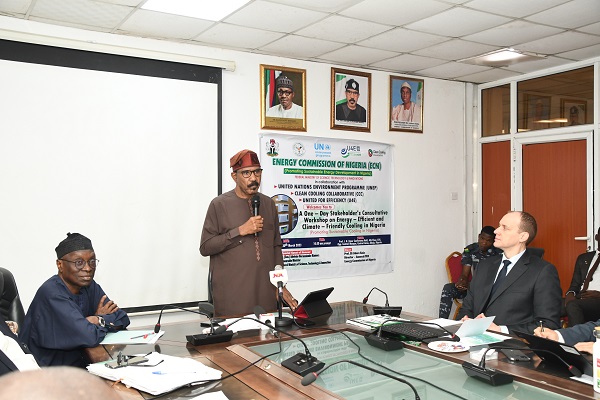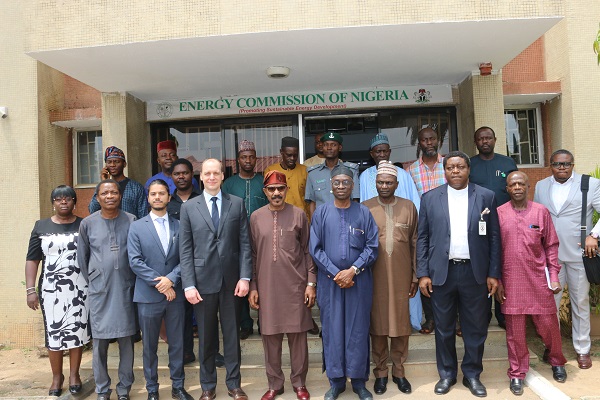
The Nigerian government has initiated a plan to achieve its Nationally Determined Conditions (NDCs) by implementing energy-efficient cooling systems.
The Minister of Science, Technology and Innovation, Sen. Adeleke Mamora spoke at a national stakeholder consultative workshop on energy-efficient and climate-friendly cooling in Nigeria in Abuja.
He noted that Nigeria is the largest market in Africa and is experiencing growing demand for air conditioners, refrigerators and other cooling devices due to the increasing population, improved lifestyle, urbanisation and global warming.
Mamora added that the country needs to implement cooling systems with minimum energy performance standards (MEPS) to achieve its NDCs. Nigeria has set unconditional greenhouse gas (GHG) emission reduction targets of 20 per cent and conditional reduction targets of 47 per cent below the business-as-usual (BAU) scenario by 2030. The government aims to achieve these targets by adopting energy-efficient best practices across all sectors.
“Nigeria’s growing population, improving lifestyle, and urbanisation, combined with rising global warming, drive demand for cooling devices,” he said. “However, most ACs and refrigerators used in the country fall short of minimum energy performance standards. The importance of scaling up energy-efficient and climate-friendly cooling cannot be overemphasized. Nigeria recognizes energy efficiency as a cost-effective means of providing energy security, increasing economic productivity, reducing local air pollution, and mitigating greenhouse gas emissions, with a target of reducing energy intensity by 2.5% per year to achieve its NDCs.”
The ‘Scaling Up Energy Efficient and Climate-Friendly Cooling in Nigeria’s NDC Revision’ project was launched in February 2022, to promote the use of energy-efficient air conditioners with low Global Warming Potential (GWP) refrigerants in public, residential and commercial buildings.
The project, implemented in collaboration with the Energy Commission of Nigeria (ECN), UNEP, Clean Cooling Collaborative and United for Efficiency (U4E), aims to contribute to Nigeria’s climate targets in a cost-effective and sustainable manner. The project will help Nigeria achieve its NDCs target of 2.5 per cent per year reduction in energy intensity through energy efficiency best practices across all sectors of the economy, according to the director-general of the ECN, Prof. Eli Bala.
The importance of efficient cooling systems cannot be overemphasized, as space cooling by air conditioning and refrigeration of products is one of the most energy-intensive services. Inefficient cooling systems lead to more emissions from conventional fossil energy sources. Hence it is necessary to ensure that efficient cooling in Nigeria should be given top priority in the development of NDC implementation plans.
However, the Nigeria Customs Service and the Standard Organization of Nigeria need to be alive to their responsibilities to avoid Nigeria becoming a dumping ground for cooling devices that do not meet minimum standards.
“Efficient cooling in Nigeria should be a top priority due to its high energy consumption and resulting emissions from fossil fuels. There is a time lag between project launch and implementation [and this has] prompted a review of timelines without altering objectives. A stakeholder engagement workshop will refresh participants on project components, strategies, and roles,” Bala said.

The programme management officer, United for Efficiency (U4E), Global Climate Action Unit, UNEP, Mr. Brian Holuj noted that Nigeria has over one million air conditioners sold every year. This means that Nigeria’s market has a ripple effect not only in Africa but around the world. The implementation of efficient cooling systems will improve the lives of everyday families, help them save money on utility bills, and make businesses more competitive.
Holuj noted that by freeing up public resources, which are being spent on electricity bills, the resources can be spent on natural gas and other resources, making cooling services more affordable and accessible to more people than ever before. Moreover, implementing efficient cooling systems will improve healthcare practices, laboratory research, business competitiveness, and student performance.
“Nigeria has a lot to gain by implementing efficient cooling systems. The adoption of energy-efficient best practices across all sectors will reduce the country’s energy intensity and mitigate greenhouse gas emissions. Efficient cooling systems will improve people’s health, make businesses more competitive, and improve student performance. The government must ensure that efficient cooling systems are adopted in public, residential, and commercial buildings. This is essential for Nigeria to achieve its NDCs’ targets and become a global leader in energy-efficient cooling systems,” he said.
Giving the workshop objectives, the director, linkages, research and consultancy, ECN, Engr. Okon Ekpenyong, said it aims to re-arrange stakeholders on the project to discuss and secure buy-in on planned activities, deliverables and associated timeframes.
Ekpenyong, the project director, said it also aims to renew stakeholders’ interest and support for the project; introduce the project team, build relationships and concur on modes and frequency of interactions; as well as inaugurate the national technical committee for the project.
The minister inaugurated the committee, chaired by ECN and consisting of Standards Organisation of Nigeria (SON); Federal Ministry of Environment (Dept. of Climate Change); Federal Ministry of Environment (National Ozone Office); Nigerian Customs Service; National Association of Refrigeration and Air Conditioning Practitioners (NARAP) and the United Nations Environment Programme-Project Technical Team.
The committee is expected to provide general guidance to the project’s implementation with focus on data collection, data analysis for updating MEPS, the ACs market monitoring and verification training.


